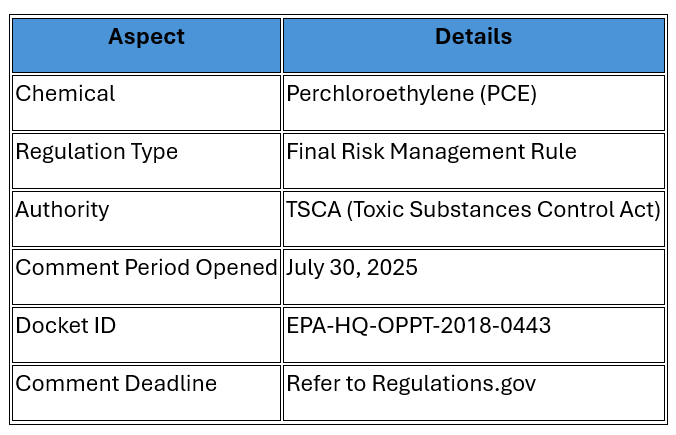EPA Opens Public Comment on Final PCE Risk Regulation
The U.S. Environmental Protection Agency (EPA) has opened the public comment period for its final risk management rule on perchloroethylene (PCE) under the Toxic Substances Control Act (TSCA). The proposed rule addresses serious health concerns related to industrial and commercial uses of PCE.
Why PCE Is Regulated ?
Perchloroethylene (PCE)—also known as tetrachloroethylene—is a volatile solvent used in:
• Dry cleaning
• Metal degreasing
• Chemical manufacturing
Following a 2020 TSCA risk evaluation, EPA determined that PCE poses unreasonable health risks, particularly via inhalation and dermal exposure. Documented health effects include:
• Cancer
• Neurotoxicity
• Liver and kidney damage
Key Provisions in the Proposed Final Rule
To mitigate these risks, EPA is proposing a range of actions:
• Ban on manufacturing, processing, and distributing PCE for certain high-risk uses
• Workplace safety programs, including ventilation and exposure monitoring
• Mandatory PPE use in occupational settings
• Labeling and recordkeeping requirements for all regulated parties
Public Comment Period Now Open
EPA is soliciting feedback on:
• Practical challenges of implementation
• Economic impacts of the rule
• Technical or scientific evidence supporting or opposing the regulation
📅 Comment Deadline: Submit via Regulations.gov
📌 Docket ID: EPA-HQ-OPPT-2018-0443
What Happens Next?
After reviewing stakeholder input, the EPA will revise the proposal if needed and issue a finalized rule. Once finalized, the rule will be legally enforceable nationwide, guiding how PCE is used, handled, and controlled.
This rule is part of EPA’s ongoing commitment to manage high-risk chemicals under TSCA and protect worker health and the environment.
Quick Summary

|
Reference: Federal Register – PCE Rule
Reach out to our regulation experts on chemical and product regulatory compliances

